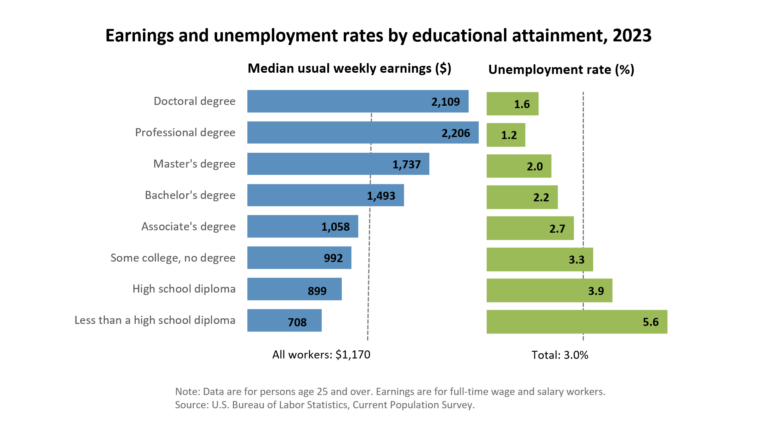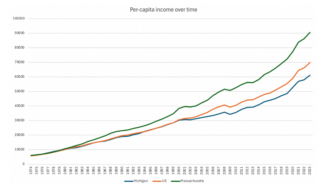
The Bureau of Labor Statistics each year publishes a chart that details the unemployment rate and median weekly earnings by education attainment for those 25 and older who work full time. Here is the data for 2023.

Year after year after year the same story. Pre pandemic and post pandemic the same story. Each time the update is published the question that comes to mind is “how can the data be misinterpreted?”. Seems like the conclusion is crystal clear: higher education attainment means the more you work and the more you earn. This is particularly true for those with a B.A. or more.
And yet we continue with a public conversation that increasingly questions the value of getting a four-year degree or more. The reality is––as these data depict––that a four-year degree or more is the most reliable path to a middle class or better career. End of story!
Part of the public conversation now is that the B.A. wage advantage is disappearing for recent college graduates. Not true! If anything the B.A. wage advantage is growing post pandemic.
A recent Pew Research Center report titled Is College Worth It? documents that the conventional wisdom of the lack of value in obtaining a B.A. post pandemic is the exact opposite of reality.
Median work earnings for full-time/year-round workers between the ages of 25 and 34. All figures are in $2022, so they are inflation adjusted.
- Median earnings for males in 2023 is $77,000 for those with a B.A.; $50,000 for those with some college but less than a B.A.; and $45,000 for those with a high school degree.
- Median earnings for females in 2023 is $65,000 for those with a B.A.; $40,000 for those with some college but less than a B.A.; and $36,000 for those with a high school degree.
How does this compare to a decade ago?
- Median earnings for males in inflation adjusted dollars is up $9,500 for those with a B.A.; $900 for those with some college but less than a B.A.; and $5,700 for those with a high school degree.
- Median earnings for females in inflation adjusted dollars is up $9,800 for those with a B.A.; $2,300 for those with some college but less than a B.A.; and $5,100 for those with a high school degree.
Who knows this story better than anyone else? Parents with a four-year degree. The Federal Reserve in its 2019 Report on the Economic Well-Being of U.S. Households measured well-being by education attainment. They found that 72 percent of those 22-29 with at least one parent with a bachelor’s degree have a B.A. This compares to 35 percent with a B.A. of those 22-29 with at least one parent with some college but neither with a bachelor’s degree and 19 percent of those with both parents having a high school degree or less.
So when elites tell you that you, your kids or grandkids are better off not pursuing a four-year degree remember that, by and large, they are doing the opposite with their children.







